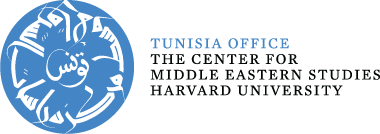
CMES TUNISIA DIGITAL HUMANITIES INITIATIVE 2020-2021
The Tunisia Office of the Center for Middle Eastern Studies at Harvard University is currently running a digital-humanities program that was initiated in the summer 2020 with a group of Harvard CMES researchers. The project aims to study, research, and disseminate a corpus of press-publications from the interwar period in Tunisia, collated and digitalized in collaboration with the CDN (Archives of the Tunisian press), the National Archives of Tunisia and National Library of Tunisia.
The corpus includes journals such as “Al-‘Alam al-Adabi” [The Literary World], a literary journal edited by Zayn al-‘Abdin al-Sanusi (1930-36); “Tūnis” [Tunisia] a newspaper also edited by Zayn al-‘Abidin al-Sanusi (1936-39, then 1948-53), and “Mabahith” [Researches] (1938-1947) a Literature, Arts, History and philosophy journal founded by Muhammad al-Bashrush in 1938; then later edited by Mahmud al-Misa’di, Abdelwahab Bakkir, Ahmad Abdessalam (1944-1947).
What makes these texts uniquely rich is the fact they group publications by eminent Tunisian scholars and artists, i.e., Tahar al-Haddad, Abu al-Qacem al-Shabbi, Bechir Kherayyef, Tahar and Fadhel Ben Achour, Ali al-Dou’aji, Hassan Hosni Abdelwahab, Zayn al-‘Abidin al-Sanusi, Mahmud al-Misa’di, Ali Belhawane and other pioneers whose work was highly influential in forging contemporary Tunisia’s cultural history. The articles and publications go beyond their strictly literary, journalistic or historical value. They provide a rare compendium of views on intellectual eclecticism, the formation of national identities, and anti-colonial movement and the National Movement, the role played by the local and regional intellectual elite, the role of the press in the formation of the state, the history of intellectual elite in the South Mediterranean.
This program is supervised by Prof. William Granara; it is moderated by Sihem Lamine and Lauren Montague. Program fellows for the 2020-21 three first program stages are: Ari Schriber (Project Advisor), Catey Boyle, Phoebe Carter, and Jack Murphy; with the valuable contribution of Sarah DeMott (Digital Humanities and Technical Advisor) and Amani Selmi (Research Assistant).
The project’s goal is to publish the results of the undertaken research and make the digitalized content available to the community of researchers with interest in the intellectual, social and literary history of Tunisia and the Region.

